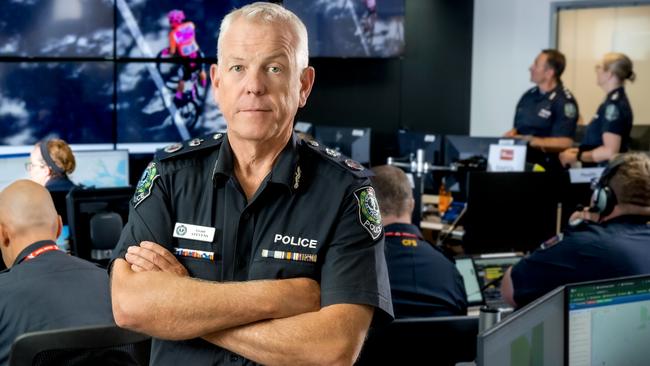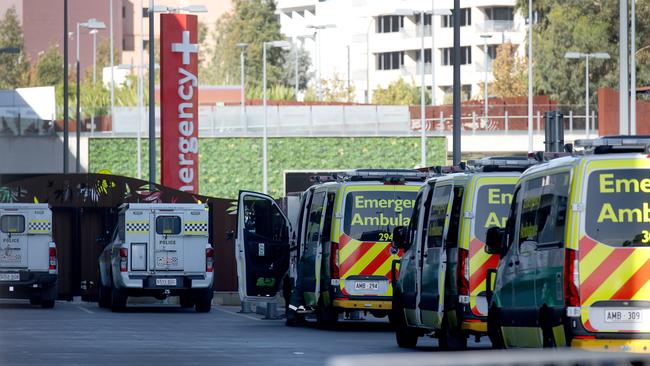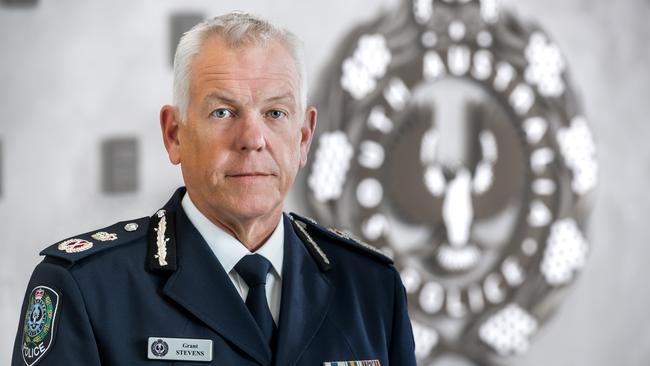SA Police Commissioner Grant Stevens calls for review into ‘mental health’ incidents that are increasing force ‘ramping’
Demand on officers transporting mental health patients to hospitals should be reviewed, the state’s top cop has urged, as new official data reveals fresh “police ramping” woes.

SA News
Don't miss out on the headlines from SA News. Followed categories will be added to My News.
Demand on officers transporting mental health patients to hospitals should be reviewed, the state’s top cop has urged, as new official data reveals fresh “police ramping” woes.
The state’s ramping chaos deepened after it emerged officers spent more than 1200 hours “delayed” at hospitals last year amid record trips with criminals or dangerous patients.
But as new force data showed this year’s festive period delays was nearly half of all delays recorded five years ago, Police Commissioner Grant Stevens called for measures to relieve officer pressures.
In written responses to questions put to him during a parliamentary committee in February, Mr Stevens – who is frustrated at increasingly complex jobs with no extra resources – said mental health processes should be reviewed as the force battles officer shortages.

He said conveyances had spiked 54 per cent over the past six years while the jobs has “remained at reasonably high levels”.
“Due to the ongoing demand for (our) services in the conveyance of mental health consumers, the process should be reviewed to identify efficiencies for (SA Police),” he wrote.
“Attendance and assessment in relation to mental health incidents should be conducted by a person trained and qualified to undertake these assessments.”
In a section titled “how can we improve this process”, Mr Stevens said “clear criteria” should be established before police attended a mental health incident including:
A PRESENT or immediate risk to a person’s life, or circumstances likely resulted in serious injury;
CIRCUMSTANCES indicate a criminal offence has been, is being or is about to be committed, which places a person in danger.

He said it would “assist” if the force’s mental health co-responded was used more and “expanded” into all metropolitan Local Health Networks, police districts and regional areas.
Police data, released under Freedom of Information laws in January, showed officers made record emergency deliveries last financial year – almost seven a day – which had more than doubled in five years.
Mr Stevens told the Upper House’s Budget and Finance Committee that his officers spent 297 hours in emergency departments in December 2024 and January this year after SA Ambulance advised of delays that left police with transport responsibility.
This compares to 667 total hours in 2019/20.
Police and paramedics are given a 30-minute “benchmark” at ED triage before delays are recorded.
Mr Stevens told The Advertiser SA Health talks would decide a reviewer while there was “extensive criteria” was already in place through agreement under the Mental Health Act with SA Health.
“They include a risk assessment on any threats to harm, any indication of weapons being present and/or if any firearms are registered to an individual or the address involved,” he said.
Chief Psychiatrist, Dr John Brayley, said greater demand was linked to a “significant” increase in methamphetamine use.
He said SA Health would work with police on the agreement.
Opposition spokesman Jack Batty said: “Labor’s ramping crisis is not only putting extreme pressure on our frontline health workers but is now impacting frontline police in the middle of a recruitment and retention crisis.”
But Police Minister Stephen Mullighan, also Treasurer, said it was up to police to determine when officers should become involved amid $300m extra for the force’s budget.
“The transfer of mental health patients to hospitals can come with a range of complexities, and police may be required to attend should a situation become dangerous,” he said.
More Coverage
Originally published as SA Police Commissioner Grant Stevens calls for review into ‘mental health’ incidents that are increasing force ‘ramping’





